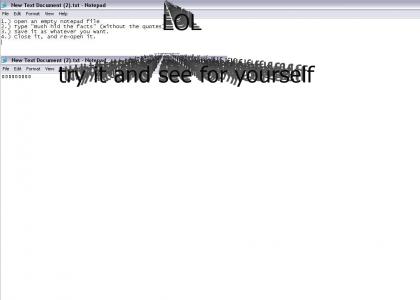windows + bush...
Created on: June 15th, 2006

Sponsorships:
| user | amount | user | amount |
|---|---|---|---|
| No one has sponsored this site ( ._.) | |||
| Sponsor this site! | Total: $0.00 | Active: $0.00 | |
Vote metrics:
| rating | total votes | favorites | comments |
|---|---|---|---|
| (4.04) | 808 | 54 | 443 |
View metrics:
| today | yesterday | this week | this month | all time |
|---|---|---|---|---|
| 0 | 0 | 0 | 0 | 39,079 |
Inbound links:
It gave me the following Chinese Characters: 畂桳栠摩琠敨映捡獴 // Then upon trying to translate in Google; 畂 桳 name Mount 敨 video games were 獴 (obviously gibberish that couldn't be fully translated; // Google searching reveals several results, but none that make any sense. Good luck finding out why this happens.
(BTW, if anyone's curious, the bug has to do with the way Notepad handles Unicode. It seems to take a guess at the composition if a certain bytevalue is present in the beginning. You only see the Chinese if you have that language support enabled, else the glyphs map to empty space, rendered by default as boxes. Thus, nothing is being hidden, just misread.)
It's a codepage error. The ASCII text "Bush hid the facts" is stored as 0x42 75 73 68 20 68 69 64 20 74 68 65 20 66 61 63 74 73. Upon opening, it is interpreted as little-endian UTF-16: 0x4275 7368 2068 6964 2074 6865 2066 6163 7473, which is then byteswapped to 0x7542 6873 6820 6469 7420 6568 6620 6361 7374. Consequently, it can only happen with an even number of characters.
In the Windows NT-based versions of Windows, Notepad can edit traditional 8-bit text files as well as Unicode text files (both UTF-8 and UTF-16, and in case of UTF-16, both little-endian and big-endian; see endianness). Notepad also has the ability to detect Unicode files that are missing the standard FF FE header. They do this by using a standard but imperfect Windows function called IsTextUnicode(). This function has the side effect that some small, all-lowercase ASCII text files get incorrectly identifie
d as UTF-16. One such file is one that contains only the 18 characters "this app can break". When opening any file containind those characters, Notepad will interpret them as two-byte Unicode and display Chinese characters (if the users computer has the proper fonts). [1] Many users improperly refer to this as an Easter Egg, when it is, in fact, a bug.
From: http://en.wikipedia.org/wiki/Notepad#_note-0
Bold
Italic
Underline
Code
User Link
Site Link